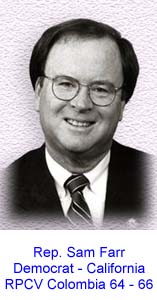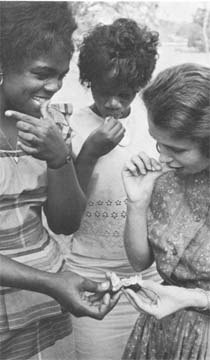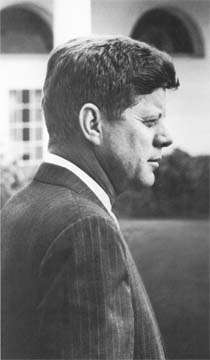May 14, 2002 - PCOL Exclusive: Interview with Rep. Sam Farr on new Peace Corps legislation
Peace Corps Online:
Peace Corps News:
Headlines:
Peace Corps Headlines - 2002:
05 May 2002 Peace Corps Headlines:
May 14, 2002 - PCOL Exclusive: Interview with Rep. Sam Farr on new Peace Corps legislation
- Interview with a volunteer in the peace corps Monday, April 26, 2004 - 4:05 pm [1]
- May 10, 2002 - PCOL Op-ed: Ken Hill - An Assessment of Proposed Peace Corps Legislation Tuesday, April 27, 2004 - 1:28 pm [4]
- May 17, 2002 - PCOL Op-ed: Joanne Roll - The New Peace Corps Legislation - High Risk/High Gain Wednesday, May 29, 2002 - 1:53 am [6]
- May 17, 2002 - PCOL Op-ed: Colin Gallagher - PROMOTE, or ACHIEVE? - A BILL to amend the Peace Corps Act Tuesday, May 21, 2002 - 5:46 pm [2]
- Peace Corps Safety and Security Monday, January 12, 2004 - 7:08 pm [6]
- Peace Corps Veterans Friday, May 24, 2002 - 9:11 am [3]
Interview with Rep. Sam Farr on new Peace Corps legislation

Introduction
For the past several months returned volunteers have known that a bill was being drafted in Congress affecting the Peace Corps. PCOL has previously reported extensively on this new legislation while it was in the planning stage. Now a draft bill has been completed and sent out for comment. Read the draft bill here.
Then read and comment on our exclusive interview with Congressman Sam Farr where he answers questions about the draft bill, discusses plans to introduce the bill, and talks about what RPCVs can do to participate in the process at:
INTERVIEW WITH CONGRESSMAN SAM FARR *
* This link was active on the date it was posted. PCOL is not responsible for broken links which may have changed.
INTERVIEW WITH CONGRESSMAN SAM FARR
By Peace Corps Online
May 14, 2002
Background
PCOL had an extended interview with Congressman Sam Farr on May 14 to talk about the new Peace Corps legislation that he and Senator Chris Dodd will soon be introducing and to discuss some of the issues that have been raised on the PCOL message boards. The interview was based on the draft Peace Corps bill RYN02.256 that has been circulating for comment. We began by asking for some background on the new legislation and asking where the idea for new legislation came from. The Congressman responded that he and Senator Dodd have been working for a long time on building congressional support for the Peace Corps. These efforts have been bolstered by Rep. Mark Udall’s recent interactions with a group of RPCVs who proposed a new mandate for the Peace Corps. Both he and Senator Dodd are Returned Peace Corps Volunteers and are interested in the Peace Corps and wanted to look at the Peace Corps historically and also to look at where it should be going. He said that Congress hasn’t looked at the Peace Corps for a long time and now with President Bush’s promise to double the size of the Peace Corps and with his emphasis on volunteerism with the USA Freedom Corps, it looked like an opportune time to revisit Peace Corps legislation.
He began by saying that the Peace Corps has traditionally been run on a tight budget. Now with the mandate to double in size, it is not just a matter of doubling the number of volunteers but making sure that the Peace Corps has the funding to focus on needed improvements in their administrative resources. In the aftermath of 9/11 he continued, more and more people are interested in volunteer service – whether volunteering to serve in the military or to serve in the Peace Corps or some other organization. We need to make sure that there is a good firewall between the Peace Corps and the military so that the Peace Corps’ mission is not compromised.

Security Concerns
We asked to talk about Security Concerns in more detail and whether the Congressman sees any problem with Section 908(a) of the USA Patriot Act when it directs the Attorney General “to carry out a program to provide appropriate training to... officials of the Federal Government who are not ordinarily engaged in the collection, dissemination, and use of foreign intelligence in the performance of their duties, … to assist such officials in identification and utilization of foreign intelligence information." Congressman Farr replied that this is a concern and that is what has triggered the need to address the Independence of the Peace Corps from the intelligence gathering community. He said that when this bill gets to the floor, we will debate this and decide how to build the best firewall.
For the moment he has no immediate concern because he has talked to people at the USA Freedom Corps and they have assured him that they are not giving out information about PCVs and the Congressman is satisfied that this is not taking place. But there will be a debate when this bill comes to the floor and we will address the issue of security concerns in the language of the bill. We must be able to assure the Host Country Nationals that the Peace Corps has no connection and does not share information with the intelligence gathering community.
Peace Corps Goals
We asked the Congressman about the Fourth Goal for the Peace Corps which is part of the bill. He referred us to the speech that Founding Director Sargent Shriver gave at Peace Corps Headquarters earlier this year (that PCOL reported on here) which was very well received in which the Director talked about how the Peace Corps helps promote global acceptance of the principles of international peace and non-violent co-existence among people of diverse cultures and systems of government. Congressman Farr said this is really not a new goal. This is something that the Peace Corps has been doing all along. What we wanted to do in the legislation is simply spell it out and institutionalize it as the fourth goal.
We asked the Congressman about changes in the wording between the First Goal as it appeared in the original Peace Corps Act of as to “help the peoples of interested countries to meet their needs for trained manpower” and how the first goal now appears in the draft legislation as “to help people in developing nations meet basic needs” and whether this change in wording means a different emphasis or has an deeper significance. He responded that it really didn’t. He said that when most volunteers go overseas they probably don’t know the exact wording of the three goals as they appeared in the legislation but that every volunteer knows what the three goals are and can express them in his or her own words and that what we have in the bill was a re-statement of the three original goals in different language and that this might change in the final version.
Grants to non-profit Organizations
We asked about the grants to non-profit organizations in the draft bill and the fact that the legislation specifies that the organizations applying for these grants have to be based in the District of Colombia and whether the intent here was that the NPCA be the only organization that is eligible for this funding. Congressman Farr replied that we need to look at this language and see if this is the language that we really want to use in the final legislation. We may decide that we don’t want to be so restrictive in our use of the language and open this up to other organizations applying for the grant.
What we don’t want to do, he said, is to create a mini-USAID with this funding. We want to promote the third and forth goals with this funding so these funds are going to be strictly limited as a way of promoting the third and fourth goals among the returned volunteer community. We asked if the funding will be competitive and who will choose which non-profits to fund and what will be the criteria they will use as the basis for their decision on. The Congressman replied that this is something that we need to look at in the final legislation.
The Volunteer Council
We asked the Congressman how he envisions the new Peace Corps Advisory Council operating? Isn’t there already an Advisory Council to the Peace Corps? Does this new Volunteer supplement it? He replied that the council will be streamlined, more focused and more effective, so that returned volunteers can use their skills rather than just participating in social events.

Volunteer Safety Concerns
PCOL asked about some comments that have been posted on our message boards that new legislation could tie the hands of the Peace Corps and removes their flexibility. For example, there is a clause in the proposed bill that talks about Country Security Reports and says each report “shall include recommendations as to whether security conditions would be enhanced by collocating volunteers with international agencies or local NGOs or with the placement of multiple volunteers in one location.” The truth of the matter is that security would probably be enhanced if we made it a rule that there have to be two volunteers in every location but that this would be a trade-off because too high a concentration of volunteers in a small town can work against volunteer efficiency and the volunteer experience so is this really a hard and fast rule that we want to recommend in every case?
The Congressman replied that we really need to revisit volunteer security in the aftermath of 9/11 to make sure that volunteers are safe and secure abroad to the best of our ability and that is what we mean in addressing security for volunteers. We asked the Congressman what he thought of the President’s push to send volunteers to Islamic countries and he replied that he absolutely agreed it is essential to increase the presence of Peace Corps volunteers in the Middle East. That is one of the best ways for them to learn about us and for us to learn about them. The question is - will they be safe? What is the middle ground of accomplishing the Peace Corps’ mission while still assuring the safety of volunteers. That is what we need to address.
The Legislation in Congress
PCOL asked if the goal in drafting the new legislation has been to craft a document that all RPCVs in Congress can get behind including Republican RPCVs like Chris Shays of Connecticut and James Walsh of New York. The Congressman replied that yes, that is the goal. He has found over the years that you cannot accomplish anything in Congress unless it is bi-partisan. The Democrats control the Senate but the Republicans control the House so any bill that passes both the House and Senate is going to have to have bi- partisan support and that is going to start by having Returned Volunteers in Congress as co-sponsors to this bill and then getting as many additional co-sponsors as possible.
We asked what the primary obstacles are to achieving the goal of passage of legislation to amend the Peace Corps Act. Congressman Farr replied that when he and Senator Dodd talked with the administration, they were originally skeptical about the need for any new Peace Corps legislation. He said the Peace Corps was also skeptical when they heard that he and Senator Dodd were drafting new legislation and wanted to know what is in the proposed bill. But he said that he and Senator Dodd want to work with the White House and with the Peace Corps on this legislation. He said that another potential obstacle is going to be how people perceive the bill and that is why we need to educate people about the benefits of this bill to the Peace Corps.

What RPCVs can do
We asked what the schedule is for introduction of the bill and what RPCVs can do to help pass this bill? Congressman Farr started out by saying that for this bill to pass it will need as many co-sponsors as possible, so as soon as the legislation is introduced, RPCVs need to write their Congressmen and ask them to support it so that this bill will have visibility. The schedule is for the bill to be ready before the Peace Corps 40th plus one. The NPCA has scheduled an advocacy day on June 20 where RPCVs will visit their Senators and Congressmen and this will be a chance for RPCVs to lobby on behalf of the bill.
We asked if the bill is still open for discussion or is it already in its final version and also what an RPCV should do if he disagrees with a part of the bill. Congressman Farr replied that the bill is still open for discussion and that he would welcome any comments on any part of the bill and that he hoped that this interview would open the door for RPCVs to see what is in the bill.
That being said, not every everyone is going to agree with everything that is in the bill. Passing legislation is the art of compromise and that even if there is disagreement over details, he hopes that RPCVs can see that the bill is overall positive for the Peace Corps, especially since it includes the enabling legislation for increasing the budget for the Peace Corps to grow to meet the President’s goal of doubling the Peace Corps within years.
Independence of the Peace Corps
We previously talked to the Congressman and he expressed his opposition to the Peace Corps becoming part of the USA Freedom Corps and we asked if that is still your position or do you think that the language in your bill keeping the recruitment separate provides enough safeguards to be effective? Congressman Farr replied that every President want to leave a legacy. JFK formed the Peace Corps. LBJ formed VISTA. Carter formed the Senior Corps. Clinton formed Americorps. Now President Bush wants to bring it all under one umbrella and create a one-stop information office to promote volunteerism. In a recent meeting with the USA Freedom Corps, Congressman Farr received reassurances that the only desire of the Freedom Corps is to coordinate American volunteerism. That in no way would jeopardize the independence of the Peace Corps.
Congressman Farr continued that this President’s credit he said he wanted to double the size of the Peace Corps and he said it on national television in the State of the Union Address. This is something that we who support the Peace Corps have been waiting years for. It is an opportunity we cannot lose. Now we need to make sure we put our money where our mouth is. We need for the Office of Management and Budget (OMB) to put money into the Peace Corps budget for the Peace Corps to grow and that is what part of this legislation will do.
In Closing
We thanked the Congressman for being so generous with his time and for the opportunity to discuss issues that had been raised on our message boards and we promised to continue informing the Returned Volunteer Community about the status of this bill which is one of the most important pieces of legislation affecting the Peace Corps since the original legislation authorizing the Peace Corps was signed into law by John F. Kennedy more than 40 years ago.


Some postings on Peace Corps Online are provided to the individual members of this group without permission of the copyright owner for the non-profit purposes of criticism, comment, education, scholarship, and research under the "Fair Use" provisions of U.S. Government copyright laws and they may not be distributed further without permission of the copyright owner. Peace Corps Online does not vouch for the accuracy of the content of the postings, which is the sole responsibility of the copyright holder.
This story has been posted in the following forums: : Headlines; Special Reports; Peace Corps - Congress; Speaking Out
PCOL490
.
I submit that the new fourth goal presented here is different in subtle but significant ways from that espoused by Sargent Shriver in the speeches in which he proposed a fourth goal. Shriver's stated new fourth goal was "to bind all humanity together in common cause to insure peace and survival for all on earth, a safe and healthy planet for all humans everywhere", in a "new world of peace". The fourth goal presented here is that the Peace Corps "helps promote global acceptance of the principles of international peace and non-violent coexistence among people of diverse cultures and systems of government". Both state positive aspirations. But while the first emphasizes the oneness of humanity to which I think the Peace Corps owes its successes so far, the second appears to water this down by explicitly mentioning and implicitly endorsing existing divisions. Part of what the Peace Corps is about is breaking down those barriers. I prefer Sargent Shriver's formulation and hope that is what gets into the legislation as a fourth goal rather than the one discussed in the above interview.






